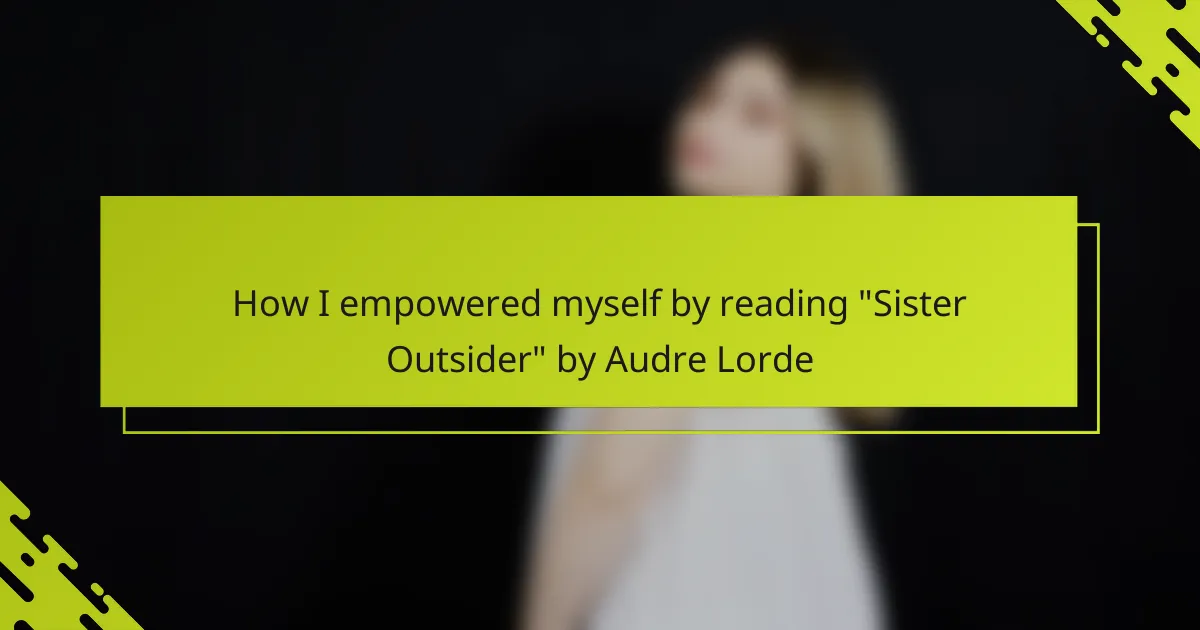Key takeaways
- Queer women culture is characterized by resilience, community, and a continuous dialogue shaped by diverse experiences and identities.
- Audre Lorde emphasizes the importance of intersectionality, honesty, and embracing differences as sources of strength and empowerment.
- Practical lessons from Lorde include using language as a tool for change, prioritizing self-care, and building coalitions across diverse communities.
- Personal growth can be fostered through reading, which encourages deeper understanding of oneself and one’s culture while exploring different perspectives.
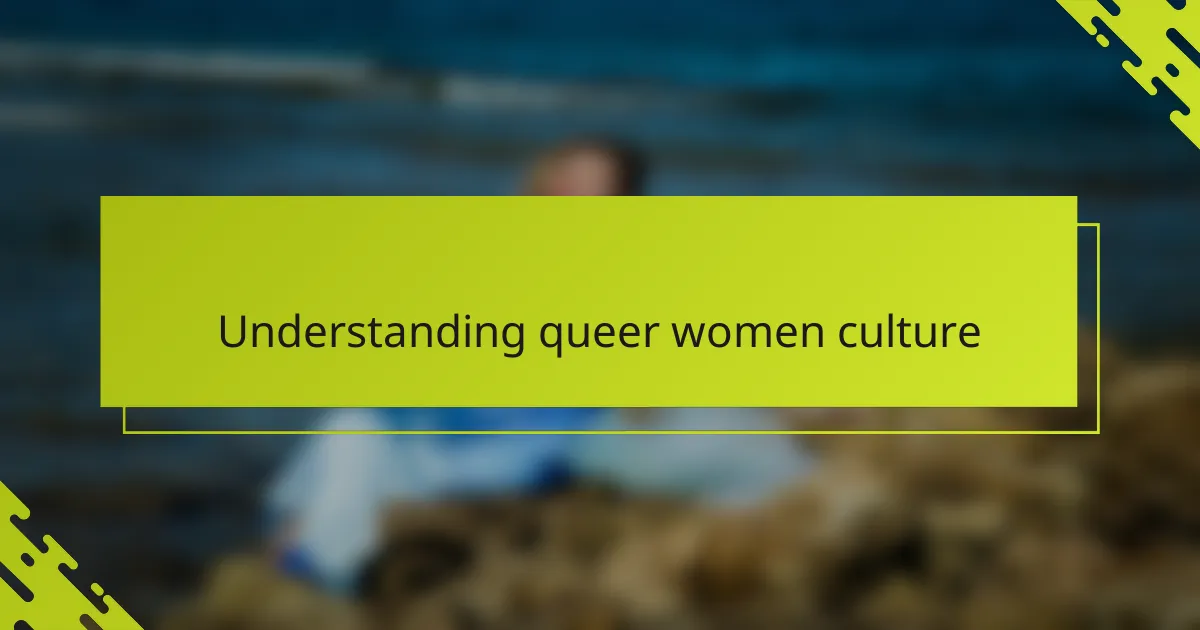
Understanding queer women culture
Queer women culture is a vibrant tapestry woven from diverse experiences, identities, and histories. I’ve found that understanding it means listening deeply—not just to stories that mirror my own, but to those that challenge my perspective. Have you ever paused to consider how the intersections of race, gender, and sexuality shape the way queer women navigate the world?
For me, acknowledging the complexity of queer women’s lives has been crucial. It’s not just about labels; it’s about understanding resilience, community, and the unspoken bonds that arise from shared struggles. When I reflect on my own journey, I realize that this culture is as much about survival as it is about celebration.
What does queer women culture look like to you? In my experience, it’s a constantly evolving dialogue—one that requires openness, empathy, and a willingness to embrace both joy and pain. This understanding has been essential to how I see myself and relate to others within this space.
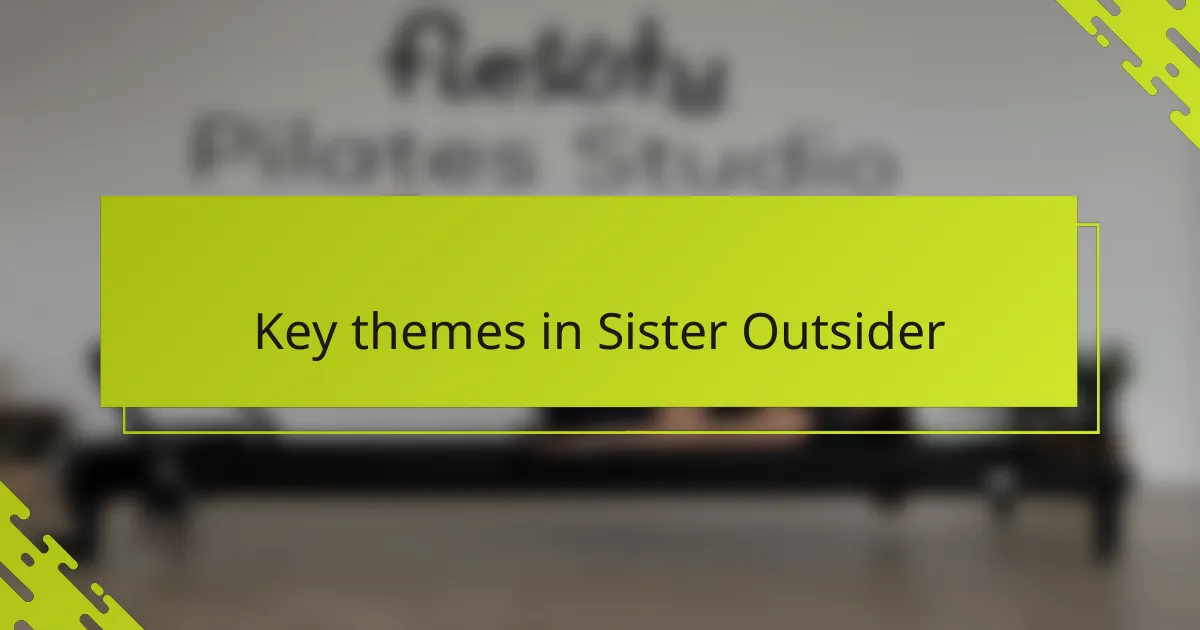
Key themes in Sister Outsider
One of the most striking themes in Sister Outsider is the power of intersectionality. Audre Lorde’s writing made me pause and really think about how my own identities overlap and influence each other. Have you ever noticed how the various parts of who you are don’t just sit side by side but actually shape your experiences in complex ways? That realization changed how I understand my place in queer women culture.
Another theme that resonated deeply with me is the call for honesty and vulnerability. Lorde challenges readers to confront uncomfortable truths about society and ourselves. I remember feeling both exposed and freed as I recognized the value of speaking out, even when it’s hard or risky. It’s this kind of courage that fuels genuine connection and personal empowerment.
Lastly, Sister Outsider emphasizes the importance of embracing difference rather than fearing it. Lorde insists that our uniqueness isn’t a burden but a source of strength. Reflecting on this, I realized how much my own variations enrich not just my life but the communities I’m part of. Don’t you think we often miss out when we try to fit into neat categories instead of celebrating what makes us different?
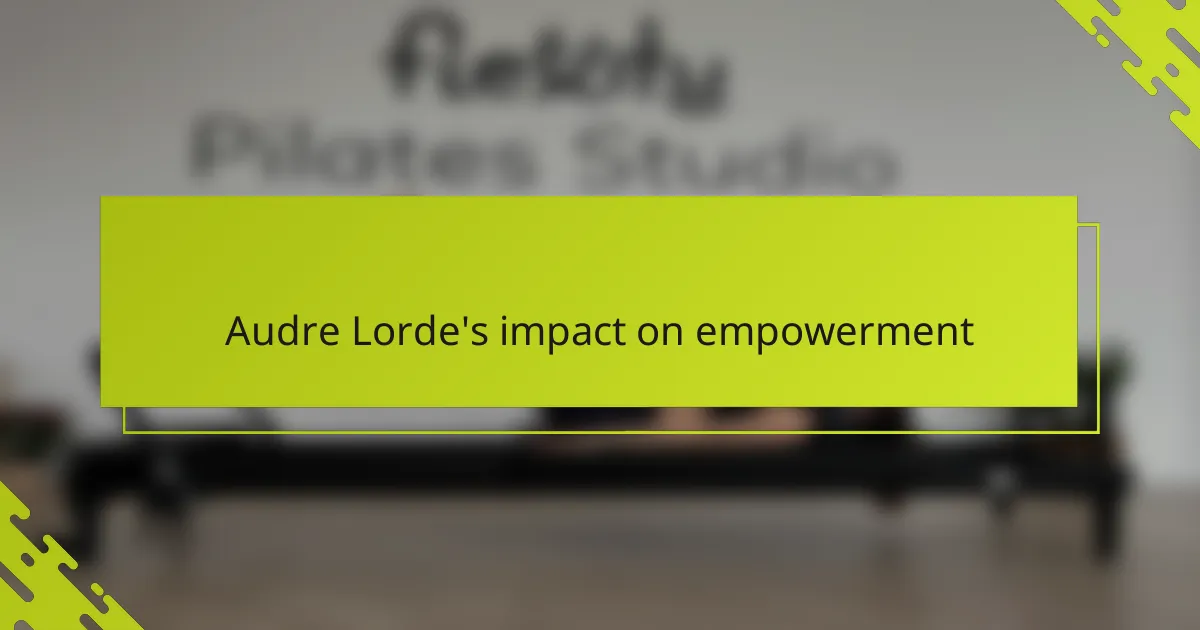
Audre Lorde’s impact on empowerment
Audre Lorde’s impact on empowerment is something I’ve felt deeply through her words. She didn’t just speak about strength; she embodied it by insisting that our voices—especially those pushed to the margins—are essential in claiming power. Have you ever experienced the rush of realizing that your story, your pain, and your joy all matter? That’s what Lorde’s work made possible for me.
What struck me most was how Lorde connected empowerment to self-acceptance and radical honesty. I remember grappling with my own fears of visibility, and her insistence that vulnerability is a source of power was like a lifeline. It challenged me to stop shrinking and instead embrace my whole self, imperfections and all. Isn’t there something profoundly freeing in that?
Also, Lorde’s fierce celebration of difference reshaped how I view community and strength. She taught me that empowerment isn’t about blending in or diluting our identities but about standing proudly in our full complexity. How often do we limit ourselves because we think we have to fit a certain mold? Lorde’s legacy encourages us to break free from that and find power in what makes us unapologetically unique.
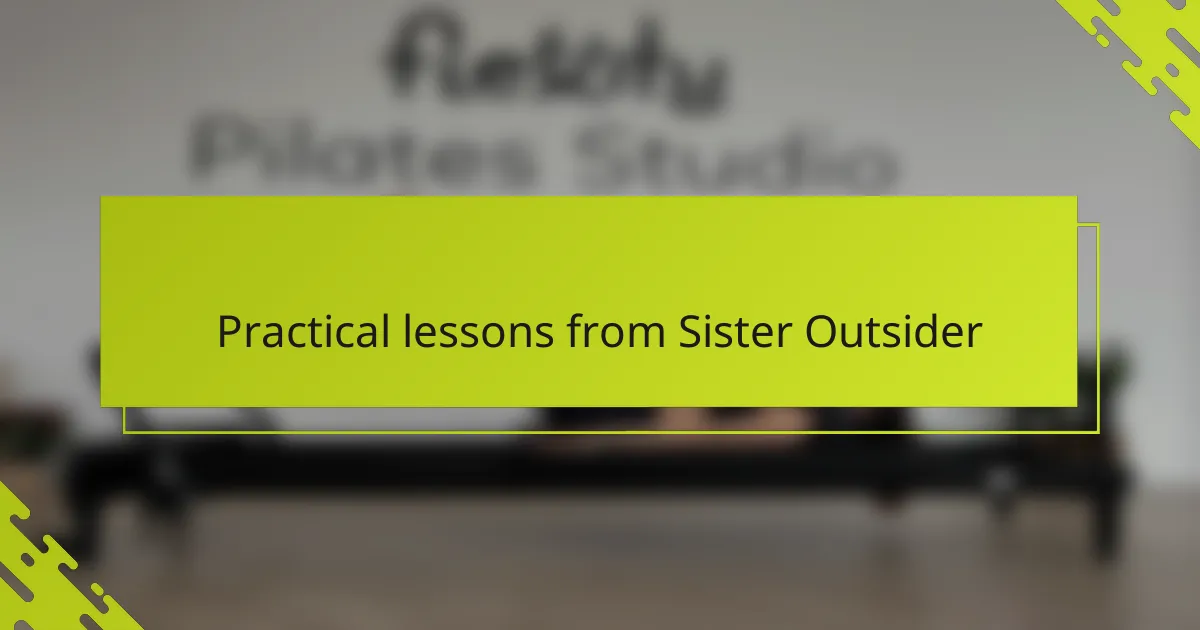
Practical lessons from Sister Outsider
One practical lesson I took from Sister Outsider is the power of language as a tool for change. Lorde’s insistence on naming injustice and calling out silence inspired me to speak up in spaces where my voice felt unheard. Have you ever noticed how simply naming a problem can begin the process of healing and transformation?
Lorde also showed me that self-care is not selfish but a radical act of survival. Reading her essays pushed me to rethink how I nurture myself amid persistent societal pressures. When I started prioritizing my own well-being, I realized empowerment grows stronger from rest and reflection, not just relentless activism.
Finally, Sister Outsider taught me the value of coalition-building across differences. Lorde’s work emphasizes that real progress happens when we recognize our interconnected struggles and support one another. How often do we look beyond our immediate circles and find unexpected solidarity? For me, embracing this lesson opened up new friendships and deeper community ties.
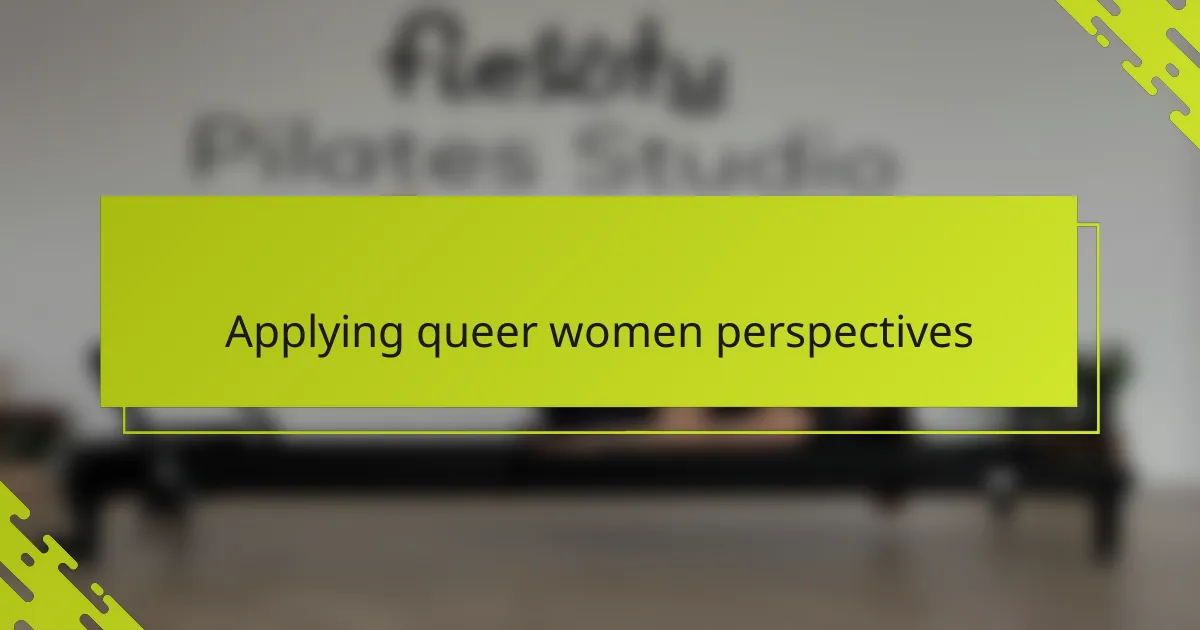
Applying queer women perspectives
Applying queer women perspectives means more than just seeing the world through a different lens—it’s about honoring the lived realities that shape identity and resistance. I’ve learned that when I ground my understanding in these perspectives, I start to notice how visibility and voice become acts of survival, not mere expression.
There was a moment when I recognized how queer women’s experiences could challenge mainstream narratives about power and belonging. It made me question: How often do we overlook the nuanced ways that race, class, and sexuality interact in everyday life? Realizing this complexity helped me embrace a more layered and compassionate view of community.
Applying these perspectives also means actively resisting homogenization. I found that embracing difference, as Audre Lorde champions, requires courage to disrupt comfortable assumptions. Have you ever felt the tension between fitting in and standing out? For me, choosing to stand out has been a vital step toward self-empowerment within queer women culture.
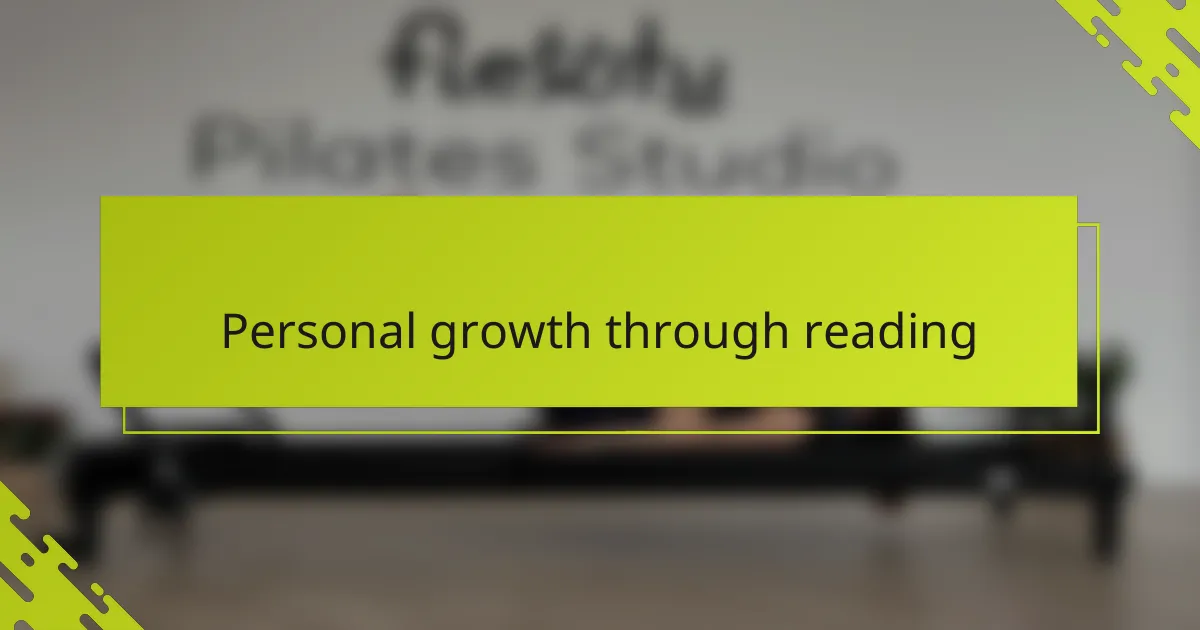
Personal growth through reading
Reading has always been a gateway for me to explore parts of myself I hadn’t fully understood. When I dove into Sister Outsider, I felt like I was looking into a mirror that reflected not just my identity, but also my potential for growth. Have you ever had that moment when a book doesn’t just tell a story but invites you to rewrite your own?
The way reading encourages me to engage with different perspectives has been transformative. I remember a particular essay where Lorde’s words lingered long after I closed the book, making me re-evaluate how I saw power and vulnerability. It wasn’t just intellectual—it stirred something deep inside, pushing me to rethink my assumptions and embrace complexity.
What’s most powerful about personal growth through reading is that it feels intimate and ongoing. Each time I revisit Sister Outsider, I discover new layers within myself and the culture I belong to. It’s a continual dialogue that challenges me to grow, resist, and celebrate who I am more fully. Have you felt how a single book can become a lifelong companion on your journey?
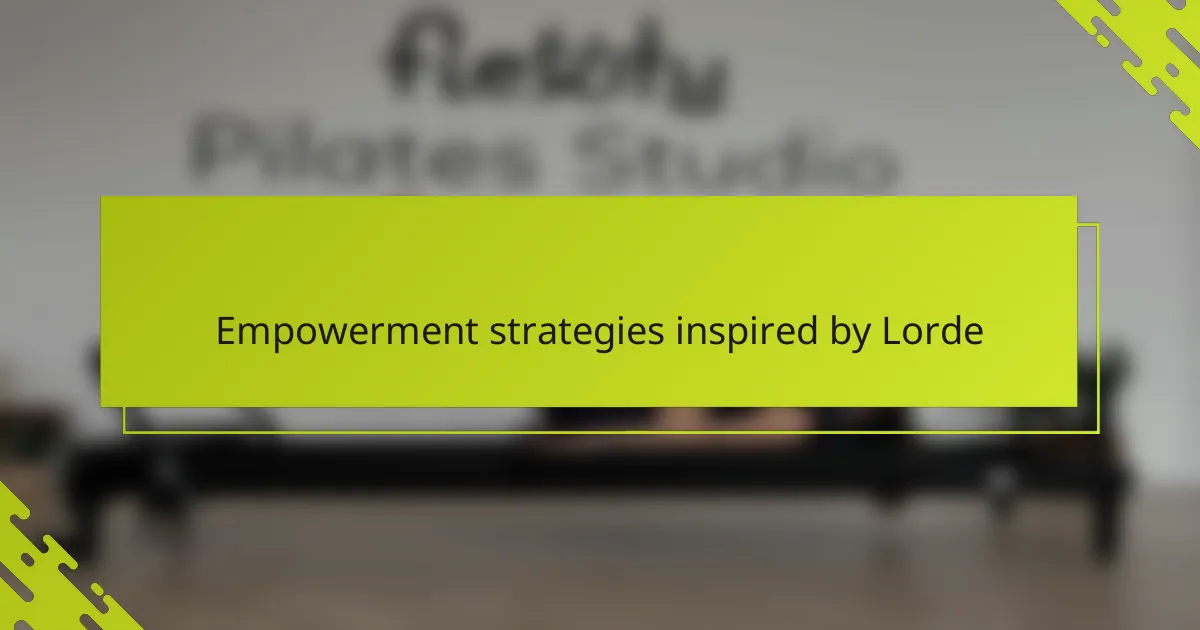
Empowerment strategies inspired by Lorde
One strategy I embraced from Lorde’s work is the radical honesty she models—being truthful with myself even when it’s uncomfortable. Have you ever noticed how admitting your fears or contradictions can unexpectedly build strength? For me, this honesty became a grounding force that empowered me to navigate complex emotions without shame.
Lorde also inspired me to see difference as a source of power rather than something to hide. Embracing my intersecting identities felt daunting at first, but her fierce celebration of uniqueness showed me that standing fully in my truth invites authentic connection and resilience. Isn’t it liberating to think that what sets us apart can actually unite us?
Finally, I learned that empowerment isn’t a solo journey. Lorde’s emphasis on building coalitions across differences made me rethink how I engage with community. When I started reaching out beyond familiar spaces, I found strength in solidarity and shared struggle. Have you experienced how collective support can amplify your sense of agency and hope?
